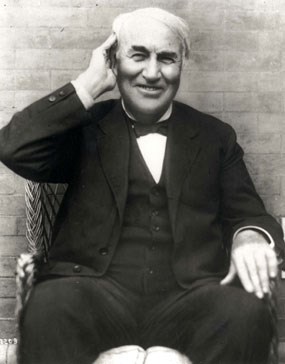
Thomas Edison NHP Archives Is the laboratory open yet? Yes! The Laboratory Complex opened in October of 2009. Now both Glenmont, Edison's home, and the Laboratory Complex are open to explore. When and where was Edison born? Thomas Alva Edison was born on February 11, 1847 in Milan, Ohio (pronounced MY-lan). His parents were Samuel Edison, who was born in Canada, and Nancy Elliot Edison. He was the youngest of seven children. He spent much of his childhood in Port Huron, Michigan. Was Edison deaf? That is how Edison described himself, but in fact he was not totally deaf. It is more accurate to say he was very hard of hearing. He once wrote, "I have not heard a bird sing since I was twelve years old." So, why didn't Edison invent a hearing aid? He often told reporters that he was working on one; sometimes he tested hearing aids designed by others. But it seems that Edison saw advantages to being deaf. For example, he said that it helped him concentrate on his work. In 1927 he told a group of 300 hard-of-hearing adults, "Deaf people [like himself] should take to reading. It beats the babble of ordinary conversation." How did he lose his hearing? Was he really boxed on the ears as a child? The movie Young Tom Edison shows Edison (played by Mickey Rooney) being boxed on the ears after he accidentally set fire to a train car with his experiments. But why, then, did Edison's father and his son Charles also have the same hearing loss? It seems that hearing loss ran in the family. An illness might also have made Edison's hearing worse. Another story, told by Edison himself, says that he was picked up by the ears to keep from falling out of a train. He said that he heard something "pop" inside his ears. Maybe Edison thought this had caused his hearing loss, but experts doubt it. Did Edison go to college? Young "Al" Edison went to school only a few months. His teachers thought he was very slow. Afterward his mother taught him at home. He then taught himself by reading constantly and trying experiments in the basement. He never attended any technical school, college or university. In later life, he said that his mother was the person most responsible for his success. Edison had strong opinions about education. Most schools, he believed, taught children to memorize facts, when they ought to have students observe nature and to make things with their hands. "I like the Montessori method," he said. "It teaches through play. It makes learning a pleasure. It follows the natural instincts of the human being . . . The present system casts the brain into a mold. It does not encourage original thought or reasoning." What's the difference between the Menlo Park Laboratory and the West Orange Laboratory? Menlo Park, New Jersey, is where Edison built a laboratory in 1876. (Menlo Park is now part of Edison, New Jersey.) There he developed the electric light system and invented the first phonograph. Newspapers started to call him "The Wizard of Menlo Park." However, Menlo Park served as his lab for only ten years. It has since been rebuilt, but now you have to go to Michigan to see it. Henry Ford rebuilt the lab as part of Greenfield Village at the Henry Ford Museum in Dearborn, Michigan. In 1887 Edison built a much larger laboratory in West Orange, New Jersey, where Edison worked until his death in 1931. In West Orange he improved his phonograph and storage battery and did all of his work on motion pictures. His lab and home in West Orange are now preserved by the National Park Service as Thomas Edison National Historical Park. Did Edison invent the first light bulb? Despite what you have probably heard, the answer is no. For at least fifty years before Edison, inventors tried to light the world using electricity. They worked with two kinds of electric light: arc lighting, which is bright enough to light a city street, and incandescent lighting, which is soft enough for use indoors. Charles Brush started his arc lighting business in 1877, two years before Edison's breakthroughs with incandescent lighting. Two points set Edison apart from the others. In 1879, he made an incandescent bulb that burned long enough to be practical,long enough to light a home for many hours. Then he and his "muckers" invented the entire system needed to bring electricity into your home--dynamos to make the electric power, wires and fuses, switches to turn the lights on and off. He invented the electric power system. How many patents did Edison earn? Edison earned 1,093 United States patents, a record number for one person that still stands. He also earned at least several hundred foreign patents from Great Britain, France, Germany and other countries. Most foreign patents were similar to the American ones. What was Edison's favorite invention? He liked the phonograph so much he called it his "baby." He also worked on the phonograph longer than any other invention--52 years--and made many improvements.
|
Last updated: March 31, 2012
